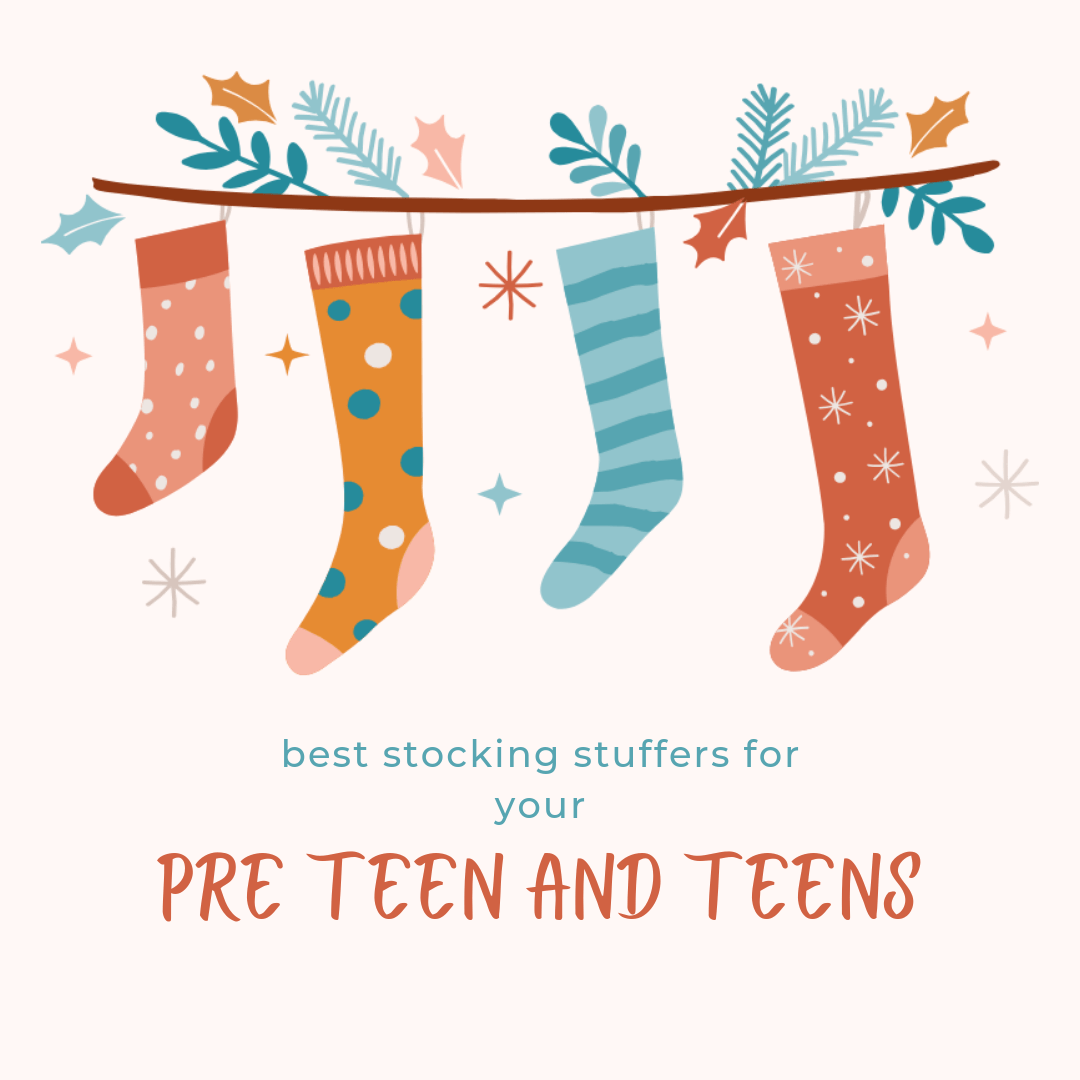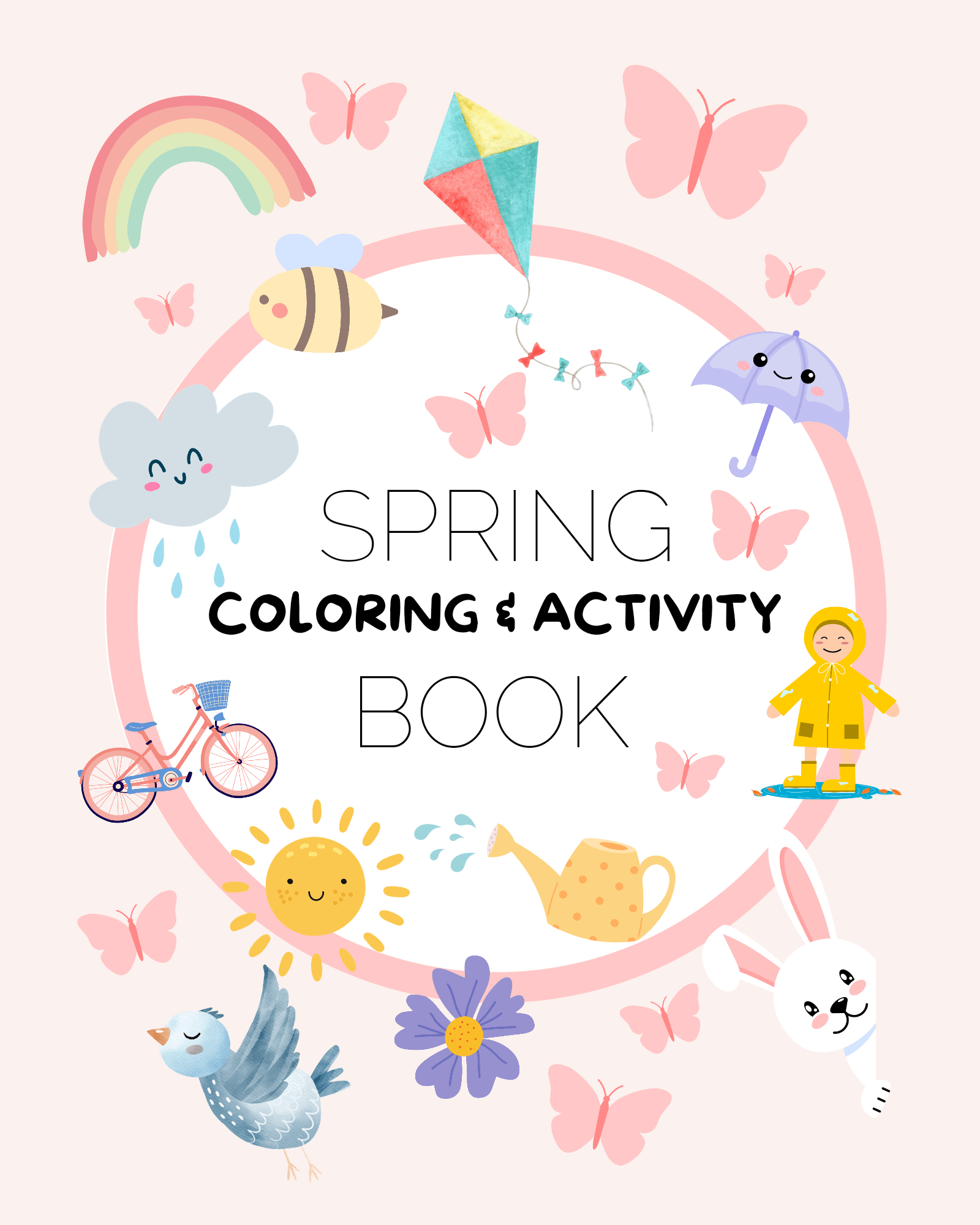Well, I did it again...
My newest SPRING Coloring and Activity Book is set to release on March 18th, 2024 right on time to help us all CELEBRATE the new season.
The snow is melting, the puddles are perfect jumping, we are slowly waking up to birds singing, and soon bits of greens, purples, pinks, yellows and more will be popping up from the ground that will bring us beauty and fragrance.
Yes.
Spring is in the air, and it's the perfect time to introduce your child to the vibrant wonders of nature with my exciting Spring-Themed Coloring and Activity Book. This blog post is especially for moms, educators, and child care providers looking for ways to engage young minds during this bright and breezy season.
With a kaleidoscope of colors waiting to burst into life at the tips of your child's crayons and a garden of engaging activities, this book is so much more than just a way to pass the time.
Read on to discover why this delightful book should flutter its way into your child's hands this spring!
1. Engaging Spring Themes
This book is a bouquet of spring themes, each page brimming with illustrations of blooming flowers, energetic animals, and sunny scenes that invite exploration and wonder.
2. Interactive Activities
Beyond coloring, this book is an interactive adventure, featuring mazes, matching games, and puzzles that keep young minds buzzing with excitement.
3. Educational Content
The joy of learning blossoms here, as each activity is designed to teach about the spring season and the critters that thrive in it.
4. Stimulates Creativity
Your child's imagination will soar like a kite on a breezy spring day, as they're given the freedom to choose their palette and personalize their masterpieces.
5. Encourages Fine Motor Skills Development
Every stroke of color and pencil-to-paper interaction is an opportunity for your little ones to enhance their fine motor skills, essential for early development.
6. Entertaining Characters
Children will meet a cast of lovable graphics that guide them through the book and bring laughter and joy.
7. Variety of Coloring Pages
No two flowers in a garden are the same, and neither are my coloring pages. With a diverse array of images and activities, there's something to spark joy in every child.
8. Seasonal Connection
Help your child connect with nature and learn about the spring season, fostering a love and appreciation for the natural world.
9. Promotes Bonding Time
This book isn't just for kids; it invites parents, siblings, and friends to join the fun, cultivating cherished memories and strengthening bonds.
10. Positive Feedback and Rewards
Each completed page presents an opportunity for positive feedback and celebration, enhancing your child's confidence and love for learning.
Nurturing creativity, educational growth, and developmental skills, our Spring-Themed Coloring and Activity Book is a delightful way to welcome the season. Whether you're a mom seeking a fun afternoon activity, an educator looking to supplement your spring curriculum, or a child care provider aiming to add variety to playtime, this book is a perfect choice.
Breathe new life into playtime this spring with a resource that promises growth, giggles, and tons of colorful fun. Watch as your child's face lights up with the vibrancy of spring with each page they color and each activity they complete.
Get excited to flower your child's world with colors and joy - grab our Spring-Themed Coloring and Activity Book released on March 18th and spread the springtime cheer! 🌷
 Living with a chronic illness is a constant battle, a struggle that extends beyond the physical symptoms and into every facet of life. It can make maintaining a regular work schedule difficult, leaving you confined to your home, dealing with a mix of debilitating symptoms like pain, fatigue, mood changes, brain fog, and other daily symptoms that make life challenging.Feeling trapped at home can compound physical discomfort with mental and emotional stress — often leading to boredom and a sense of isolation. But there are coping mechanisms and activities that can bring solace and even joy during these tough times.
Living with a chronic illness is a constant battle, a struggle that extends beyond the physical symptoms and into every facet of life. It can make maintaining a regular work schedule difficult, leaving you confined to your home, dealing with a mix of debilitating symptoms like pain, fatigue, mood changes, brain fog, and other daily symptoms that make life challenging.Feeling trapped at home can compound physical discomfort with mental and emotional stress — often leading to boredom and a sense of isolation. But there are coping mechanisms and activities that can bring solace and even joy during these tough times. Enter your book era: Reading as an Escape
Reading is not just a way to pass the time; it's a gateway to other worlds. It's an activity that can be as restful or as stimulating as you need, depending on what you choose to read. Whether it's fiction that takes you on adventures far from the confines of your home, or non-fiction that stimulates your mind and expands your knowledge, reading is a versatile companion through the ups and downs of chronic illness.
Tips for Making Reading a Rewarding Experience:
• Choose books that lift your spirits or engage your curiosity.
• If concentration is difficult, try audiobooks. They can be comforting and require less physical strain.
• Join online book clubs or reading communities to connect with others and share thoughts about what you're reading.
My Favorite Reads for February
February may be the shortest month of the year, but it didn't stop me from devouring some incredibly captivating books. Here's a rundown of the stories that kept me company alongside a cozy drink and a comfy couch:
The Seven Husbands of Evelyn Hugo
By: Taylor J Reid
Description: Aging and reclusive Hollywood movie icon Evelyn Hugo is finally ready to tell the truth about her glamorous and scandalous life. But when she chooses unknown magazine reporter Monique Grant for the job, no one is more astounded than Monique herself. Why her? Why now?
Monique is not exactly on top of the world. Her husband has left her, and her professional life is going nowhere. Regardless of why Evelyn has selected her to write her biography, Monique is determined to use this opportunity to jumpstart her career.
Summoned to Evelyn’s luxurious apartment, Monique listens in fascination as the actress tells her story. From making her way to Los Angeles in the 1950s to her decision to leave show business in the ‘80s, and, of course, the seven husbands along the way, Evelyn unspools a tale of ruthless ambition, unexpected friendship, and a great forbidden love. Monique begins to feel a very real connection to the legendary star, but as Evelyn’s story near its conclusion, it becomes clear that her life intersects with Monique’s own in tragic and irreversible ways.
https://amzn.to/3TiMFVz
I'm Glad my Mom Died
By: Jennette McCurdy
Description: Jennette McCurdy was six years old when she had her first acting audition. Her mother’s dream was for her only daughter to become a star, and Jennette would do anything to make her mother happy. So she went along with what Mom called “calorie restriction,” eating little and weighing herself five times a day. She endured extensive at-home makeovers while Mom chided, “Your eyelashes are invisible, okay? You think Dakota Fanning doesn’t tint hers?” She was even showered by Mom until age sixteen while sharing her diaries, email, and all her income.
In I’m Glad My Mom Died, Jennette recounts all this in unflinching detail—just as she chronicles what happens when the dream finally comes true. Cast in a new Nickelodeon series called iCarly, she is thrust into fame. Though Mom is ecstatic, emailing fan club moderators and getting on a first-name basis with the paparazzi (“Hi Gale!”), Jennette is riddled with anxiety, shame, and self-loathing, which manifest into eating disorders, addiction, and a series of unhealthy relationships. These issues only get worse when, soon after taking the lead in the iCarly spinoff Sam & Cat alongside Ariana Grande, her mother dies of cancer. Finally, after discovering therapy and quitting acting, Jennette embarks on recovery and decides for the first time in her life what she really wants.
Told with refreshing candor and dark humor, I’m Glad My Mom Died is an inspiring story of resilience, independence, and the joy of shampooing your own hair.
https://amzn.to/3UX9AXJ
The Guest List
By: Lucy Foley
Description: The bride – The plus one – The best man – The wedding planner – The bridesmaid – The body
On an island off the coast of Ireland, guests gather to celebrate two people joining their lives together as one. The groom: handsome and charming, a rising television star. The bride: smart and ambitious, a magazine publisher. It’s a wedding for a magazine, or for a celebrity: the designer dress, the remote location, the luxe party favors, the boutique whiskey. The cell phone service may be spotty and the waves may be rough, but every detail has been expertly planned and will be expertly executed.
But perfection is for plans, and people are all too human. As the champagne is popped and the festivities begin, resentments and petty jealousies begin to mingle with the reminiscences and well wishes. The groomsmen begin the drinking game from their school days. The bridesmaid not-so-accidentally ruins her dress. The bride’s oldest (male) friend gives an uncomfortably caring toast.
And then someone turns up dead. Who didn’t wish the happy couple well? And perhaps more important, why?
https://amzn.to/3UX8dbe
My favorite this month ... I'm glad my mom died.
By: Lucy Foley
Description: The bride – The plus one – The best man – The wedding planner – The bridesmaid – The body
On an island off the coast of Ireland, guests gather to celebrate two people joining their lives together as one. The groom: handsome and charming, a rising television star. The bride: smart and ambitious, a magazine publisher. It’s a wedding for a magazine, or for a celebrity: the designer dress, the remote location, the luxe party favors, the boutique whiskey. The cell phone service may be spotty and the waves may be rough, but every detail has been expertly planned and will be expertly executed.
But perfection is for plans, and people are all too human. As the champagne is popped and the festivities begin, resentments and petty jealousies begin to mingle with the reminiscences and well wishes. The groomsmen begin the drinking game from their school days. The bridesmaid not-so-accidentally ruins her dress. The bride’s oldest (male) friend gives an uncomfortably caring toast.
And then someone turns up dead. Who didn’t wish the happy couple well? And perhaps more important, why?
https://amzn.to/3UX8dbe
My favorite this month ... I'm glad my mom died.
This memoir leaves you feeling heartbroken, angry and disappointed for the struggles in the life of Jennette. Her brutal honestly made you feel like you were living it and in her shoes.
Each title has infused this month with excitement, introspection, and a little sadness. They were all different in genre and writting style but inited in their ability to captivate and provide a retreat from the humdrum of life and a distraction from your daily battle from chronic illness.
Each title has infused this month with excitement, introspection, and a little sadness. They were all different in genre and writting style but inited in their ability to captivate and provide a retreat from the humdrum of life and a distraction from your daily battle from chronic illness.
Chronic illness can make you feel like you're living in the shadows, but within those shadows, you can find activities that not only fill your time but also provide comfort and joy. Reading and books in general can help you face the resilience of these daily battles is commendable.
Did any of these titles make it to your book list? What are you reading right now? Share your thoughts in the comments.
Ps. If you to are in your book era check out my boutique featuring comfy clothing and merchandise perfect for all the book lovers.
Book clothing isn't just about wearing your love for literature on your sleeve – it's about making a statement of who you are and what you cherish. Keep the pages turning and the fashion current!

'Tis the season for jolly laughs, festive decorations, and of course, the delightful tradition of stuffing stockings! As you ponder over what to gift the pre-teen and teen in your life this year, fear not, for I have come to your rescue! With this carefully curated list of the best stocking stuffers that are sure to impress, you'll be the envy of Santa himself. So sit back, relax, and let me guide you through the magical world of stocking stuffers that every pre-teen and teen dreams of unwrapping this holiday season. Whether it's everday items that come in handy or trendy accessories and fun trinkets, you are covered. Let the gifting adventure begin!
1. Fun and unique items such as stickers from characters in their favorite show, book or singers
2. Must-have items such as headphones, power banks, or phone mounts
3. Gift cards to their favorite stores or coffee shop...hello
4. Treats and snacks they will love like gum, chocolate and candy canes
Pur gum use $2.96 coupon
5. Journals for self-care and getting all the feelings out...or mother and child team journaling
6. Cozy items like fuzzy socks warm socks
7. Entertainment items like DVDs, video games, card games and board games
8. Personal care items like lip balms, makeup, face wipes and other skin care products
9. Creative books such as coloring books, comic books, and more
10. Colorful pens or markers
11. Shampoo and conditioner...we buy it all the time anyways so tuck it in your kiddos stocking
12. Underwear nothing more needs to be said
13. Razor blades, body wash, bath bombs can make bath time relaxing at the end of a long day
14. Deodorant: Practical and essential, a nice deodorant can be a useful stocking stuffer for teenagers
15. Unique jewelry pieces, like a bracelet or necklace with a meaningful message
16. Movie tickets to see their favorite films with friends
17. A subscription to an online magazine or magazine from the rack at the grocery store
18. A new pair of comfy, warm winter pyjamas
19. A new book...cause what's better then reading a great book while on winter break
20. Hair ties, clips, or a new hair brush
21. A new Christmas Ornament A festive ornament to start their own collection or to add to a special tree of their own
22. Nee Doh Stress Balls These squishy stress balls are small enough to fit in a stocking and provide a tactile outlet for relieving stress
23. A new toothbrush and toothpaste
24. A new water cup or fun straw covers
Use $2.00 off coupon
Use $1.00 off coupon
26. And if you have an accident prone pre teen or teen a pack of bandaid will always come in handy
Use $1.00 off coupon
Stockings are a holiday tradition that brings joy and excitement to children everywhere. The possibilities are endless when it comes to stuffing stockings with fun, functional and sometimes basic gifts that your pre teen/teen will use every day. Whether you choose to fill it with practical items like socks or a new toothbrush, or opt for something more playful like stickers and candy, the key is to not overthink it and simply have fun shopping for your kiddos. So, get creative and put together a stocking that will bring a smile to your teens face. Because let's face it, there's nothing quite like the thrill of discovering what surprises lie within that festive red sock on Christmas morning!
*This post contains links. If you make a purchase through these links I may get a small commission from your sale.

With school almost coming to a close at the end of the month it's time to think about keeping our bodies healthy and strong...cause summer colds and feeling unwell is not worth it.
We all know that during the summer months, it's crucial to take care of your physical and mental health while enjoying the warmer weather. Apart from maintaining a healthy diet and exercise routine, taking supplements can help support your wellness goals. Here are some of the best supplements to consider using during the summer:
1. Vitamin D: Since the sun is the primary source of vitamin D, it’s important to get outside and soak up some sun rays. However, spending too much time in the sun without protection can be harmful to your skin. Taking vitamin D supplements can help support your immune system, promote healthy bone growth, and improve your mood.
2. Probiotics: Summer is the perfect season for outdoor activities, which can also expose you to harmful bacteria. Taking probiotic supplements can help support your gut health, improve your digestion, and boost your immune system.
3. Vitamin C: This essential vitamin is known for its immune-boosting properties and can help protect your skin against damage from UV rays. Consuming vitamin C supplements can help reduce inflammation and promote healthy collagen production for younger-looking skin.
4. Omega-3 fatty acids: These healthy fats are found in fish, nuts, and seeds and can help protect your heart health. Taking omega-3 supplements during the summer can help reduce inflammation in the body, improve brain function, and promote healthy skin.
5. Hydration support: Staying hydrated should be at the top of your list during summer. Young Living's Ningxia Red will promote stamina and is a great choice for hydration support and delivering a quick dose of energy.
Incorporating these supplements into your daily routine can help keep you healthy and energized during the summer months. As always, consult with your healthcare provider before starting any new supplement regimen.
Want to know a secret?!
Did you know that there is a huge difference between Young Living® supplements and regular store-bought supplements?
Young Living® supplements have an 80% absorption rate compared to conventional supplements, which only have a 30% absorption rate. That is a 50% increase and it also means you get way more bang for your buck and the supplements will be that much more effective when you switch.
Are you wondering how it works? Young Living® supplements are infused with essential oils which help increase the assimilation (absorption) of other nutrients on a cellular level and they help remove waste from the cells, which helps detoxify them, in turn causing the cells to function at a higher level.
The bottom line... is that you should 100% be taking Young Living’s supplements over your store-bought ones.
To learn more about our supplements feel free to read through our Supplement Unsung Heroes!
1. Vitamin D: Since the sun is the primary source of vitamin D, it’s important to get outside and soak up some sun rays. However, spending too much time in the sun without protection can be harmful to your skin. Taking vitamin D supplements can help support your immune system, promote healthy bone growth, and improve your mood.
2. Probiotics: Summer is the perfect season for outdoor activities, which can also expose you to harmful bacteria. Taking probiotic supplements can help support your gut health, improve your digestion, and boost your immune system.
3. Vitamin C: This essential vitamin is known for its immune-boosting properties and can help protect your skin against damage from UV rays. Consuming vitamin C supplements can help reduce inflammation and promote healthy collagen production for younger-looking skin.
4. Omega-3 fatty acids: These healthy fats are found in fish, nuts, and seeds and can help protect your heart health. Taking omega-3 supplements during the summer can help reduce inflammation in the body, improve brain function, and promote healthy skin.
5. Hydration support: Staying hydrated should be at the top of your list during summer. Young Living's Ningxia Red will promote stamina and is a great choice for hydration support and delivering a quick dose of energy.
Incorporating these supplements into your daily routine can help keep you healthy and energized during the summer months. As always, consult with your healthcare provider before starting any new supplement regimen.
Want to know a secret?!
Did you know that there is a huge difference between Young Living® supplements and regular store-bought supplements?
Young Living® supplements have an 80% absorption rate compared to conventional supplements, which only have a 30% absorption rate. That is a 50% increase and it also means you get way more bang for your buck and the supplements will be that much more effective when you switch.
Are you wondering how it works? Young Living® supplements are infused with essential oils which help increase the assimilation (absorption) of other nutrients on a cellular level and they help remove waste from the cells, which helps detoxify them, in turn causing the cells to function at a higher level.
The bottom line... is that you should 100% be taking Young Living’s supplements over your store-bought ones.
To learn more about our supplements feel free to read through our Supplement Unsung Heroes!

We've all heard the phrase "listen to your gut" or "trust your intuition" at some point in our lives. And while the concept may sound simple enough, there are countless moments when we find ourselves questioning our instincts and doubting the path that feels right to us. We've been told time and time again that following our intuition may not be the wisest of decisions, but what if we've been wrong all along? As I get closer and closer to finding answers to my health I could have ignored my intuition and agreed with what everyone was telling me. But the little nudge to keep digging to find the answer never left. So here are a few reasons why listening to your gut may be the smartest choice you ever make...they worked for me. I hope you find them helpful.
Your intuition is unique to you...
No two people are the same, and that means that your intuition is a reflection of your personal experiences, perspectives, and beliefs. You know yourself better than anyone, and your intuition is a reflection of that inner knowledge. When people tell you not to trust your gut, it's usually because they're operating under a different set of circumstances or beliefs. What works for them might not work for you, so it's crucial to trust your intuition to guide you down the right path.
Your intuition is backed by science...Science has shown us that our bodies have physical responses to things before our conscious mind is aware of them. If you have a feeling about something, it's often worth paying attention to. Intuition is a result of the way our brains process information, and when we're presented with unfamiliar situations, our intuition is often the first response we have. It's a survival mechanism that's been honed over thousands of years of evolution, so trusting your intuition is, in some ways, trusting your primitive instincts to keep you safe.
Your intuition can help you avoid regrets...
How many times have you thought back to a situation where you ignored your intuition and regretted it? Whether it's a missed job opportunity or a bad relationship, we've all been in situations where we knew deep down that things weren't quite right, but we went against our gut instinct anyway. Listening to your intuition can help you identify potential pitfalls before they become major regrets, and can help you make life-changing decisions that will bring you long-term fulfillment.
Your intuition can help you navigate uncertainty...
Uncertainty is a fact of life, and there are times when no amount of research or analysis can help you make the "right" decision. That's where your intuition comes in. Your gut instinct is your subconscious mind processing information that you might not even be aware of. It can help you navigate those gray areas where there's no clear answer, and can help you make confident decisions that feel right, even when you can't explain why.
Your intuition is something to be proud of...
Finally, it's important to remember that trusting your intuition is a sign of strength and self-awareness. It takes courage to go against the advice of others and make a decision that feels right for you. And while it may not always lead to a positive outcome, your intuition is an integral part of who you are, and it should be celebrated and nurtured.
In a world where we're constantly bombarded by the opinions of others, it's easy to lose sight of our own inner voice. But if there's one thing to take away from this discussion, it's that your intuition is a valuable resource that should never be ignored. Whether you're making a big decision or simply navigating the ups and downs of daily life, your gut instinct can guide you to the right path, even when it seems like the odds are against you. So the next time someone tells you not to trust your intuition, remember that you have the power to make your own choices, and that your gut instinct may just be the smartest one yet.



